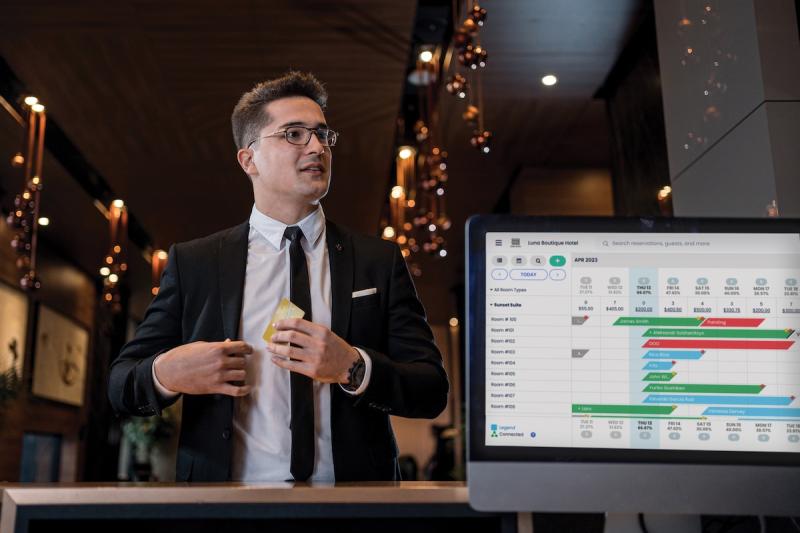High turnover and persistent labor shortages have burdened hotels since the pandemic. Hoteliers have learned how to fully use their property management systems to their advantages or learned the limitations of their legacy systems. Many workers have left the industry completely, worsening a staffing shortage that had been going on even before the pandemic. This shortage can impact a hotel's PMS in several ways, including affecting training, maintenance and support and impacting data entry and accuracy.
Staffing issues are a cross-industry challenge these days, but most glaringly so in the hospitality space. A recent report from the Bureau of Labor Statistics shows the hospitality industry has the highest turnover rates of any sector at 86.3 percent, compared to the national average of 47.2 percent, said Adelle Rodriguez, senior director of marketing at Solonis.
There are two ways these staffing challenges are impacting PMS use, Rodriguez continued. "First, it creates a bigger demand for flexible technology platforms that simultaneously simplify operations and enhance guest experiences," she said. "Property management systems can help empower small hotel teams with the tools and data to do their jobs efficiently and effectively.
"Secondly, I’ve seen hotels turn to their PMS to help plan ahead. As an industry, we’re in an era of recovery and growth, so property owners and managers are tasked with balancing travel demand with staffing shortages,” Rodriguez said.
Hoteliers can use PMS data to assess booking patterns, predict when a property will be slow or busy and influence staffing schedules. “When you pair your PMS with business intelligence and predictive analytics tools, you can make data-driven business decisions that can help scale your property despite staffing challenges.”
Aside from modern solutions being much faster and much easier to use, hoteliers have stressed the benefits of a shorter training time. There's a much higher bar for technology and vendors in general today—hotels just can't afford for employees to take three weeks to learn a system, said Don DeMarinis, SVP of sales and marketing at Agilysys. “It needs to be easy to learn, easy to use day to day and provide value to the hotel and its guests,” he said.
Hotels have lost a lot of institutional knowledge so the new talent needs to learn quickly, agreed Tanya Pratt, VP of strategy and product management for Opera Cloud PMS at Oracle Hospitality. “The application needs to be their teacher—easy to learn, easy to understand and ready to go,” she said. “The PMS needs to be complex in all the ways the hotel needs to manage the business but easy for those new employees to use.”

The new generation of hotel works will tolerate less, Pratt continued. “They have grown up in a digital age and everything is accessible and consumable—they are expecting the same on their job,” she said. “If they can do it all on their phone for their personal life, they expect that of their business life as well.”
Modern mobile PMS systems are built to empower staff and help hoteliers get the most out of small teams. Mobile user interfaces are meticulously designed around human psychology and the "on-the-ground" experiences and frustrations of hotel workers themselves, Stayntouch Chief Product Officer Dan Hogan said. "The result is a vibrant and intuitive UI that is easy to use and can dramatically reduce training times from weeks to just 90 minutes per module."
Integrations are move vital than ever
Property management systems today extend beyond what sits behind the front desk. There’s mobile check-in, self-serve products and kiosks, mobile F&B ordering and service optimization tools. A modern PMS has modern APIs and it is well connected to all of these other technologies. It's very powerful. The trick is that the PMS has got to be well connected. “There's not a lot of value in a technology product that only tells the PMS 80 percent of what it needs to know to make that technology journey come full circle for the guest,” Marinis said. “Integrations are very important, and modern APIs are very, very important today. They've got to be very, very robust for them to really be optimized well at the property level.”
The PMS might be the heart of a hotel’s technology stack, but no platform is an island. To deliver a unified, seamless and hyper-personalized guest journey, hotels have to invest in a unified and seamless ecosystem of platforms, Hogan said. "Even a single touchpoint, such as fully mobile check-in, requires the integration of numerous platforms: a PMS with mobile check-in functionality, a digital payment gateway and a keyless entry system."
Integrations are becoming increasingly critical as they can help hotels to customize their tech stack and provide a seamless experience for their staff and guests, said Janet Jaiswal, VP of marketing at Cloudbeds. “Integrations, which sync data between systems and automate businesses processes, can improve a hotel’s operational efficiency, enhance the guest experience, increase revenue and help them stay competitive in a rapidly evolving industry,” she said.
“The channel manager, booking engine and payment processor are certainly among the most important integrations to have. I consider those integrations table stakes,” Jaiswal continued. “You can’t really run your hotel business properly if you don't have those systems. Ideally, your PMS has those systems not just as integrations, but fully built in as part of a unified platform.”
